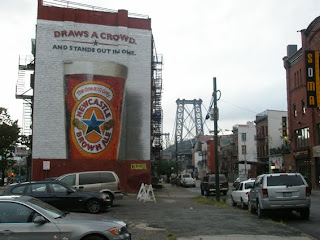
Lou Reed did it and many fans still haven’t forgiven him. Marc Bolan did, too, and it cemented his place on golden oldie radio forever. Jewel and Mandy Moore both did it, in opposing directions with opposing commercial results. So did The Killers and, in Australia, Evermore on their last album, those occasions acting like fingers down the throat of the media, eliciting equal measures of critical spew and praise for their ‘hot new look’.
The practice of ‘reinvention’ is often pinned in music press to pop artists whose latest music and visual style change is viewed as akin to Domino's injecting yet another layer of quadruple-fat cheese into their bulging crusts – it’s there to get us salivating at the counter but, three minutes later, we’ve forgotten what it was we just rammed inelegantly into our gobs. Or we’re left regretting the empty pleasure and wiping the stain off our pants.
It’s an act often seen as a cynical marketing ploy, only acceptable when the product is transparently there to be sold as instant-gratifier – ie. the so-called ‘queen of reinvention’, Madonna – and derided when its undertaken by, primarily, bands whose ‘credibility’, and therefore the credibility of their audience, is at stake.
The truth is, of course, that nearly every artist reinvents at some point in their career (even if it’s a reinvention into a silent, inactive artist – every action has an impact on the assessment of an artist’s work). Some people simply call it having new ideas, or moving on. Something M.I.A said to US Rolling Stone recently, however, has had me thinking about the role and perception of reinvention in popular culture. “I just want to be real, whatever that is,” she said of her work on her upcoming third album. “Even if my songs are shit, and if I have flaws and if I’m confused, if I offend people or if I don’t offend people, I might try to work it out in public, just so you know that it’s OK to think, that thinking’s not a dirty word.”
There is, as M.I.A alluded, this idea that reinvention must be done out of the sightline of the audience. When an artist goes into hiding, escapes our memories and emerges a changed entity, it’s as if the mystery of their inspiration adds some level of genius – not like a magician performing a trick, but like a ditzy high-school graduate going off to university and returning with a new vocabulary and a wiser take on life. We assume a level of ‘authenticity’. If we could see the work that went into it, it might not be so incredible an act. For M.I.A, however, the ‘realness’, as she puts it, might be elevated if the invention or reinvention is done in front of the audience; the authenticity brought about by a visible ownership of the ideas.
One artist whose new output disputes this is ROMY. Previously – or otherwise – known as Melbourne rapper Macromantics, the moniker under which she signed to cerebrally advanced US label Kill Rock Stars and released her Moments In Movement album in 2006, Romy Hoffman has ‘reinvented’ with an extremely well realised and heartening take on fantasy-riding dance pop. Her first single as ROMY, out the first week in February but already able to be heard on her MySpace – myspace.com/rahromyruckus – is Sleep, a smart dancefloor banger with enough trance keys and threateningly buzzing beats to throw it so far into ‘now’ we’ll all be catching up for some time.
The Hoffman ‘revamp’ (as she calls it on MySpace) also includes introducing her as a singer. A sneak preview of more tracks to come produces endlessly catchy vocal hooks, more moving (in both senses) beats and some intriguing influences. Not to mention an imaginative, fashion-forward new image. OK, it’s a hot new look, but at least, unlike The Killers, it’s actually hot.
Like M.I.A, Hoffman has always been an artist who shows it’s OK to think, yet they’ve taken different approaches to what they’ve allowed the public to see of their latest ‘reinventions’. Does it matter? It doesn’t seem to. For all this talk of ‘authenticity’ and ‘changed entities’, what really matters is the quality of the end work. As Avril Lavigne discovered when she slipped on a hot-pink mini and broke into sadly choreographed cheer-dancing a couple of years back, if you haven’t got the goods it doesn’t matter what you’re reinventing yourself as.








